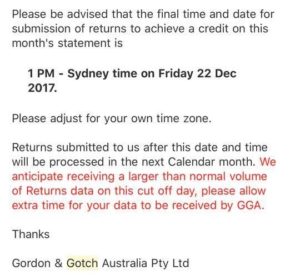RETAIL NEWSAGENCY SALES BENCHMARK: JULY – SEPTEMBER 2017 vs. 2016
New product categories key to helping newsagents overcome collapsing magazine, newspaper and stationery sales.
The July – September quarter continued the tough year for traditional products in Australian newsagency businesses.
The gap between businesses enjoying success and those challenged increased.
The traditional newsagency has no future. That is, the business with newspapers, magazines, lotteries, stationery and cards. Quarter after quarter, the performance on those businesses continues the trajectory of declining traffic and revenue, which can only end in closure.
At the other end, businesses that have diversified into products that are not traditional in range and price point for newsagencies are more likely to (but not always) find success.
Business closures.
Before I get into the benchmark results, I want to address another data point, store closures. It looks like 2017 will end with between 400 and 450 newsagency business closures. The number is difficult to tie down given there is no one place all newsagencies are registered.
The question is: – is this rock bottom, is the closure number for 2017 the worst we will see? Only time will tell. I suspect 2018 will be an equally tough year. I say this based on the number of newsagency business owners who refuse to dramatically alter the course of their businesses, expecting traditional suppliers to bring the change necessary to turn the business around.
The reasons for closure vary from financial trouble to lease costs to retirement to in ability to sell and no will to keep running the business.
Business performance data do not lie. The best performing businesses in the newsagency channel, which includes businesses some would no longer call newsagencies, are those trading away from traditional categories. These businesses still have some of the traditional categories but they do not rely on them at the core of their businesses.
Business closures can be avoided, if there is will, early will, on the part of the business owners. There are plenty in the channel who can provide real help. The key is to ask.
Benchmark headline numbers.
Here are the headline numbers by key product category:
- Magazine unit sales declined 13.5%.
- Greeting card revenue declined 4%.
- Lottery revenue declined 2%.
- Newspaper unit sales declined 12%.
- Gift revenue increased by 13%.
- Toy revenue increased by 12%.
- Plush revenue increased by 14%.
- Stationery revenue declined 11%.
The above percentages reflect the overall performance of the 173 newsagency businesses in this benchmark study. It includes stores from a range of banner groups as well as independents. There are large businesses and small. Some are in shopping centres while others are on then high street.
What is concerning is the pace of decline of what were once core traffic generation – magazines and newspapers.
Newsagency businesses that are not engaged with a net new traffic strategy are heading for trouble.
Newsagents need to manage the overhead cost of newspapers and magazines. Labour, space and capital investment must reflect the gross profit contribution of these categories.
Stationery was a challenge this quarter. Looking more closely at the data, it is the higher volume business, OfficeSmart type volume business, where there are challenges.
That card performance this quarter matches the previous quarter is a concern. Looking at stores reporting growth, one factor is how cards are managed – active management by the business, as opposed to the card suppliers, is key. The card department is no longer a department we can expect to work without management support.
GOOD NEWS.
Yes, there is good news.
- One store achieved $58,000 in everyday and higher end plush sales in the quarter, up 20% from the same quarter a year back.
- A suburban store grew plush to $17,000 in the quarter, up 30% on 2017.
- A regional high street store grew gifts to $38,000 in the quarter, up 22% on 2016.
- A small country town business entered toys earlier this year and in the July – September quarter tracked $4,900 in sales in a category in which they had no presence a year earlier.
- A suburban newsagency entered the games category this year and booked more than $8,000 in revenue from games in the September quarter. That is 100% new business.
- Plenty of businesses reported gift revenue growth of 20% or more. These are city and country businesses, high street and centre.
Looking more closely at the businesses enjoying growth, it comes from hard work in the business, relentless hard work.
OVERALL PERFORMANCE DATA.
- Customer traffic. 75% of newsagents report average decline of 6%.
- Overall sales. 59% reported an average revenue decline of 3%.
- Basket depth. 66% report a 2.5% decrease in basket size.
- Basket dollar value. 62% report a decrease in basket value of 3%.
It is in the overall business gross profit numbers where the differences in businesses can be seen. Of this latest dataset: 64% sit in the traditional newsagency GP performance band of 28% – 30%. 7% sit below 28%. 20% sit in the GP band of 30% and 35%. 7% sit between 35% and 40%. The rest, 2%, have a GP of more than 40%.
GP is a function of what you stock and the type of shoppers you attract to the business. Buying is where it starts.
WHAT IS DRIVING THE DECLINES?
I think the traffic decline is being driven by a decline in interest in legacy products on which traditional newsagency businesses have relied. I have said for years it is crucial newsagents have a strategy to drive net new traffic. Relying on legacy product to sell new products is not a plan. You need to source new products and to use these to attract people to your business who would otherwise not have shopped with you.
We can grow sales of legacy products by bringing people into our businesses from other reasons. Once in-store some will buy papers and magazines.
HOW TO RESPOND TO TRAFFIC DECLINES?
Any newsagency business can be successful, regardless of location and situation. This is truer today than at any time in the past thanks to what we can see being achieved online – not only in newsagency businesses but through other retail channels.
The key to success is to not run the business as a newsagency. That’s is, to not obsess about legacy products. Focus on new traffic products. Focus on price points you would usually say would never work in your business. Buy products you think will never work. Be radical and through discover what is possible in your business.
I urge you to ask yourself daily, what have I done today to reach a new shopper, someone who does not know we exist? This is what successful businesses in the benchmark study are doing and doing well.
DOES THE NEWSAGENCY CHANNEL HAVE A FUTURE?
I ask this every quarter. My answer has changed – not in the form Australians identify as a newsagency.
AGENCY IS OVER.
There is no upside in any agency parts of the business. People saying they are proud to be called a newsagent are entitled to their view. History will show that era is behind us.
OPTIMISTIC.
I am optimistic for my own businesses and for the businesses of many newsagents.
WHY I DO THIS STUDY
My interest in the study is as a newsagent and as a supplier to the channel through Tower Systems and through newsXpress. I want the channel to grow for selfish reasons and because it has been my life since 1981. I am invested.
BENCHMARK GOALS
I am often asked for benchmark goals newsagents ought to aim for. Here are some benchmarks I have developed in my work with newsXpress and through Tower Systems:
- Gross profit: this is the goal gross profit for all product sales not taking into account any revenue or costs related to any agency business. The traditional newsagency average sits at 28% to 32%. For a newsagency focused on the future, the goal has to be at least 45%.
- Ratio of Gift revenue to Card revenue: 50% minimum. The goal ought to be 100% or more. If you do $100K a year in cards, target to do $100K in gifts, or more.
- Revenue per employee – $250 an hour minimum not including agency revenue. This is a contentious KPI. If you think it is not for you, work the numbers back and see what your number needs to be based on each labour hour in the business.
- Revenue PSQM $4,500 – $8,500 depending on country vs. city / high street to shopping centre and depending of product mix. Higher GP lower revenue required.
- Overall revenue mix percentage targets: Cards: 25%; Gifts/toys/plush: 25%; Stat: 10%; magazines/newspapers: 20%; other: 15%.
- FLOORSPACE ALLOCATION: Cards: 25%; Gifts/toys/plush: 25%; Stat: 8%; magazines/newspapers: 15%; other products: 15%; office/back room / counter: 12%. It’s rare you make money from an office or store room.
- Mark-up goals: Stationery: 125%; Gifts 110%; plush: 110%.
- Occupancy cost: between 9% and 11% of revenue where revenue is product revenue plus commission from agency lines. Location and situation are a big factor in this benchmark. For example, a large shopping centre business will have a higher cost than a high street situation.
- Labour cost: between 9% and 11% of revenue where revenue is product revenue plus commission from agency lines. Labour cost should include fair market costs for all who work in the business. (See above).
Mark Fletcher.
Email: mark@towersystems.com.au Website: www.towersystems.com.au
 One of the easiest ways to attract a new shopper into any retail business is to pitch products that connect with passion(s), theirs or those for whom they purchase gifts. Some passions are easy to spot while others are obscure.
One of the easiest ways to attract a new shopper into any retail business is to pitch products that connect with passion(s), theirs or those for whom they purchase gifts. Some passions are easy to spot while others are obscure.














